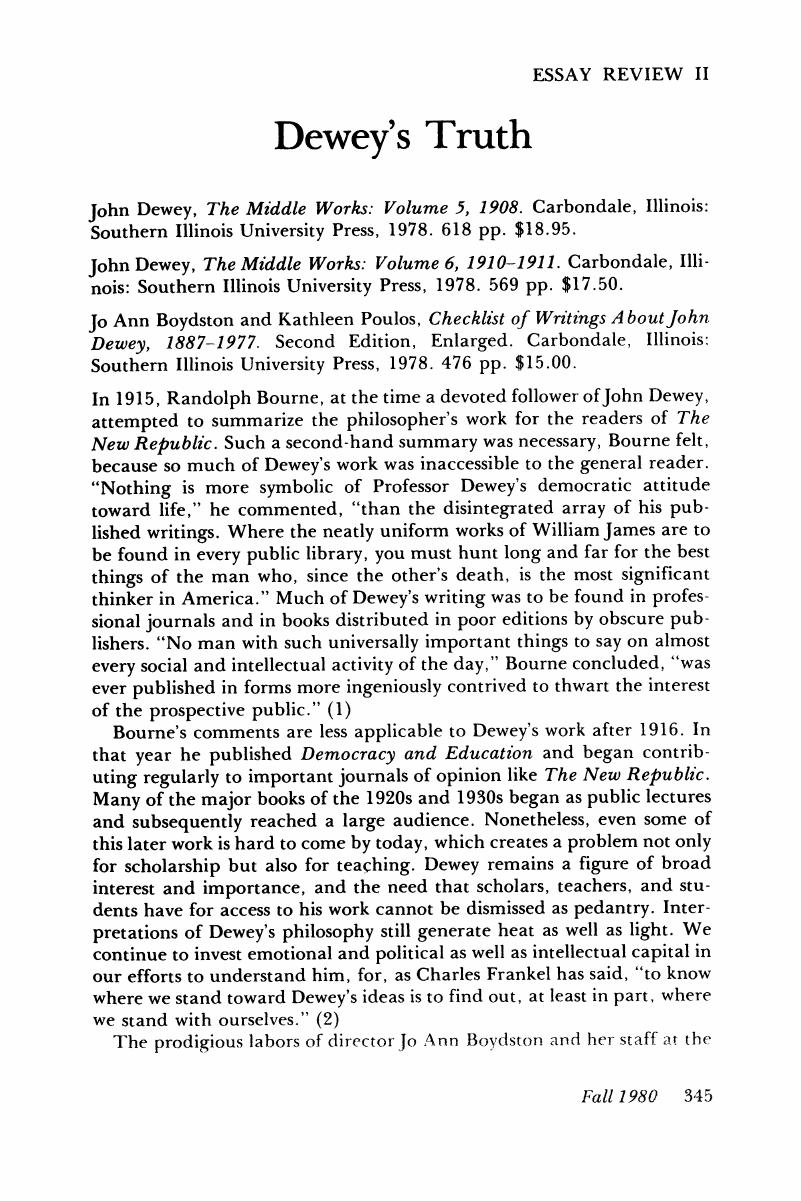Published online by Cambridge University Press: 24 February 2017

1. Bourne, Randolph, “John Dewey's Philosophy,” New Republic, 2 (13 March 1915): 154.Google Scholar
2. Frankel, Charles, “John Dewey's Legacy,” American Scholar, 29 (1960): 331. Evidence of the ideological conflict Dewey's work can generate may be seen in a recent exchange of views in the History of Education Quarterly, 15 (Spring and Winter, 1975).Google Scholar
3. An important recent study of the “professionalization” of philosophy at Harvard is Kuklick, Bruce, The Rise of American Philosophy: Cambridge, Massachusetts, 1860–1930 (New Haven, 1977). This fine book accents the need for fuller study of the Chicago-Columbia school of American philosophy, which resisted, for a time, the dynamic Kuklick traces.Google Scholar
4. The Journal of Philosophy has recently published a collection of Dewey's writings in this journal and the responses of his critics, including the realists, Dewey and His Critics, ed. Morgenbesser, Sidney (New York, 1977). Dewey's roots in idealism are familiar, but one of the many merits of Kuklick's book is its demonstration of the roots of Harvard philosophy, including realism, in the Kantian problematic. The fact that idealism at Michigan and Chicago in the 1880s and 1890s was neo-Hegelian, while that at Harvard was neo-Kantian, might explain some of the tension within the pragmatic camp. See also Murphey, Murray G., “Kant's Children: The Cambridge Pragmatists,” Transactions of the Charles Peirce Society, 4 (1968): 3–33.Google Scholar
5. Rorty, Richard has explored this element of Dewey's thought and coupled him with a seemingly unlikely ally, “Overcoming the Tradition: Heidegger and Dewey,” Review of Metaphysics, 30 (1976): 280–305.Google Scholar
6. An astute study of the connections between epistemology and politics that draws on Dewey's insights is Wood, Ellen, Mind and Politics (Berkeley, 1972). Recent work in the history and sociology of science has reached some recognizably Deweyan conclusions. See especially Laudan, Larry, Progress and Its Problems: Towards a Theory of Scientific Growth (Berkeley, 1977).Google Scholar
7. The most notable example of this charge was, of course, Bourne's “Twilight of the Idols” (1917), and the most familiar recent example is probably White, Morton, Social Thought in America: The Revolt Against Formalism (Boston, 1957), pp. 243–246.Google Scholar
8. This might surprise those who know Dewey by way of White's Social Thought in which Mill is portrayed as an important “formalist” against whom Dewey was “revolting.” In the Ethics, “formalism” is an epithet reserved for Kant and his followers, and Mill's efforts to temper Bentham with a Romantic notion of the personality is viewed by Dewey with considerable sympathy.Google Scholar
9. Macpherson, C. B. has, using a concept of “developmental liberty” quite similar to Dewey's, recently constructed a novel, non-Marxist critique of market society, Democratic Theory: Essays in Retrieval (Oxford, 1973), especially the criticisms of Sir Isaiah Berlin's concepts of negative and positive liberty, pp. 95–119.Google Scholar